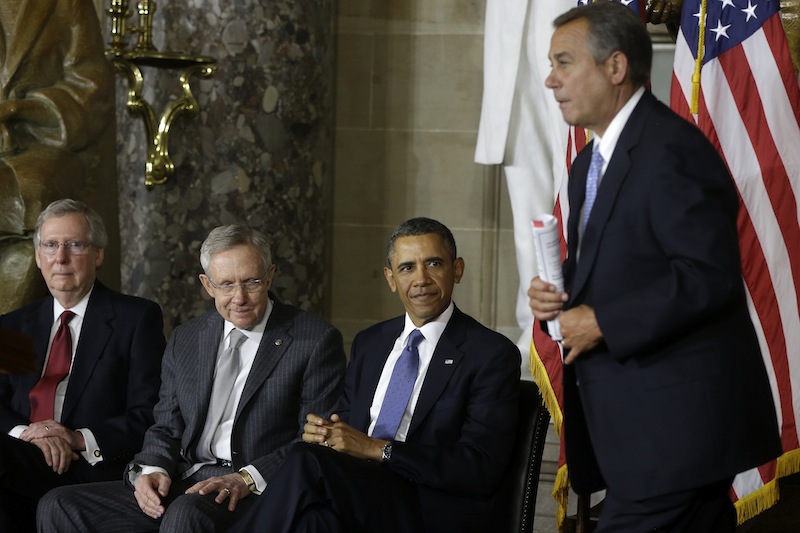The congressional debate over whether to authorize President Barack Obama’s push to attack Syria is poised to bleed into at least next week, when Congress officially returns to session and faces tight deadlines to avert fiscal Armageddon this fall.
When Congress reconvenes Monday, it has just nine working days to keep the government funded past Sept. 30, and an additional seven working days after that to ensure the country can continue to meet its debt service obligations beyond mid-October.
Leaders in both chambers have promised Syria votes next week. A Senate committee has approved a resolution to strike Syria. Its House counterpart has held hearings, but the House Republican majority hasn’t yet drafted its own resolution, so nothing has advanced out of committee yet. All of which means the debate over military action will eat up part of the calendar next week.
“Instead of coming into session next week and diving right into a budget debate, we will be debating Syria and budget issues will be on the back burner,” said a senior Democratic aide. “This means that after Syria is finished, the [government funding] debate will be extremely compressed and the debt limit debate will be shorter.”
So broadly speaking, how does Syria affect the upcoming fiscal battles? The answer depends on how quickly it gets resolved and how many Republicans end up signing on.
In the favorable scenario, the Syria resolution passes quickly, Republican opposition ends up being fractured and mostly benign, and the fiscal debate plays out as it would have anyway. The upside is a continuing resolution to fund the government and a debt limit increase were never expected to get bogged down in the regular legislative process; they’d be negotiated by party leaders and fast-tracked for votes in the House and Senate. If leaders are able to walk and chew gum at the same time, Syria’s impact on the budget debate may be limited.
In the less favorable scenario, the Syria debate drags on, and complicates the politics of averting fiscal disaster. House Speaker John Boehner (R-OH) is supporting Obama’s call for action in Syria, but many if not most Republicans are currently skeptical or opposed. In the toxic climate of internal GOP politics, it’s perilous to be on the same side of an issue as Obama. In particular, if most Republicans end up voting no on Syria in defiance of the House leadership, it could chip away at Boehner’s limited political capital with his House conference. He already faces the unenviable task of talking his members down from their unrealistically high demands for unwinding Obamacare and cutting entitlement spending as a price for lifting the debt ceiling.
If things play out this way, Boehner may face greater pressure to engage in the sort of brinkmanship that brought the U.S. government within hours of default in the summer of 2011. The Speaker doesn’t want to let that happen and his last resort would be to avoid it without the buy-in of most House Republicans. The likely upheaval would not only imperil his job, it could send chills through the economy.
Alternatively, the dynamics of a tight time window alongside the initiation of another military conflict may strengthen Boehner’s case for averting a budget crisis as Syria takes center stage. But that’s not likely to sway ultraconservative Republicans, so the likelier endgame would be a short-term resolution that merely postpones the inevitable fight. This could be done by temporarily raising — or “suspending,” to make it seem more politically palatable — the debt ceiling for a few weeks or months.
Substantively, the Syria debate strengthens the argument for unwinding the sequester in a continuing resolution, said Steve Bell, a well-connected former Republican budget aide. “I think Syria will influence the [continuing resolution], but not the debt limit,” he said. “You can negotiate on a CR — the levels, the sequester and so on. I think there’s going to be a fair amount of horsetrading there. But the debt limit is a different horse.”
Democrats also hope a Syria strike will help them cut a deal to repeal sequestration, by shining a light on the added burdens on the military, which like many domestic programs is set to face a new round of indiscriminate across-the-board cuts.
The budget fight was always going to be painful, particularly for Boehner, who faces a variety of competing, and seemingly irreconcilable pressures. But the timing of the Syria debate appears likely to alter his political calculus.






